

Quick Tip: Is Creating an Online Community Right for Your Organization? [Video] I field a lot of questions in my day-to-day phone calls and emails with organizations researching online communities.
![Quick Tip: Is Creating an Online Community Right for Your Organization? [Video]](http://cdn.pearltrees.com/s/pic/th/community-organization-115116180)
I’m about to help a variety of different types of businesses and membership organizations, at all different stages of the research and planning processes. The questions I answer most often center around the doubts and obstacles that come into play when considering launching an online community. These are my favorite questions to answer because there is no simple, black and white answer. No two organizations are the same. Without careful analysis, there is no immediate clear-cut yes or no. The Water Network Guidelines. The Water Network Guidelines.
Alex Stiver - The Open University (UK), Centre for Research in Computing. The State of Online Branded Communities 2012. The Network Secrets of Great Change Agents. Artwork: Jessica Snow, Louis II, 2010, acrylic on paper, 13.5" x 11.5" Change is hard, especially in a large organization.
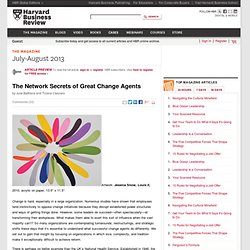
Numerous studies have shown that employees tend instinctively to oppose change initiatives because they disrupt established power structures and ways of getting things done. However, some leaders do succeed—often spectacularly—at transforming their workplaces. What makes them able to exert this sort of influence when the vast majority can’t? So many organizations are contemplating turnarounds, restructurings, and strategic shifts these days that it’s essential to understand what successful change agents do differently.
There is perhaps no better example than the UK’s National Health Service. In tracking 68 of these initiatives for one year after their inception, we discovered some striking predictors of change agents’ success. 1. 2. 3. You Can’t Do It Without the Network Formal authority is, of course, an important source of influence. - Tomorrow Makers' Journal - Assembling Complexity: When the community practically falls together. "Evolution not only evolves the functioning community, but it also finely tunes the assembly process of the gathering until the community practically falls together.
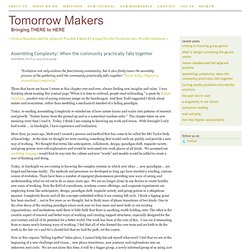
" Kevin Kelly, Chapter 4, Assembling Complexity" Those that know me know I return to this chapter over and over, always finding new insights and value. I was thinking about naming this journal page "When it is time to railroad, people start railroading. " a quote by Robert Heinlein...another way of saying everyone jumps on the bandwagon. Social Ecosystems. 2011 State of Online Branded Communities Study. Third annual study shows need for more and better community management Social marketers are getting more focused and sophisticated in how they are integrating community into their owned digital assets.
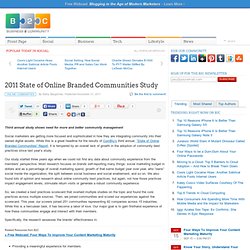
While this is a great headline for the results of ComBlu’s third annual, “State of Online Branded Communities” Report, it is tempered by an overall lack of growth in the adoption of community best practices since last year’s study. Our study started three years ago when we could not find any data about community experience from the members’ perspective. Most research focuses on brands self-reporting many things: social marketing budget in dollars and as a percentage of overall marketing spend, growth of that same budget year over year, who “owns” social inside the organization, the split between social business and social enablement, and so on.
So, we created a best practices scorecard that overlaid multiple studies on the topic and found the core practices across multiple sources. A Community? A Network? An Audience? We have a lot of semantic issues in the social media/online space.
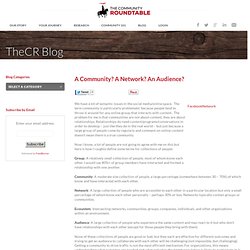
The term community is particularly problematic because people tend to throw it around for any online group that interacts with content. The problem for me is that communities are not about content, they are about relationships. How To Build An Online Community: The Ultimate List Of Resources (2012) Community Maturity Model - Enterprise Social Media. Being in Management Consulting I am a sucker for Frameworks and Maturity Models.
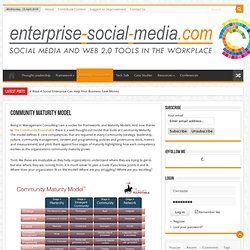
And now thanks to The Community Roundtable there is a well thought out model that looks at Community Maturity. The model defines 8 core competencies that are required in every Community (strategy, leadership, culture, community management, content and programming, policies and governance, tools, metrics and measurement) and plots them against four stages of maturity highlighting how each competency evolves as the organizations community maturity grows. Tools like these are invaluable as they help organizations understand where they are trying to get to but also where they are coming from. It is much easier to plan a route if you know points A and B. Where does your organization fit on the model? Image Source: Click Here.
Community Maturity Model. We developed the Community Maturity Model (CMM) to help organizations understand, plan for and assess the performance of community and social business initiatives.
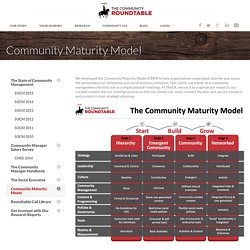
Our clients use it both as a community management checklist and as a organizational road map. At TheCR, we use it to organize our research, our curated content and our training services so that our clients can easily connect the dots and use our research and content in their strategic planning. This model articulates two concepts required to advance the business of community. First, it defines the eight competencies we believe are required to build successful business communities.
Second, it articulates how these competencies progress from hierarchical organizations to those that have embraced a networked approach to their business. A Community? A Network? An Audience?